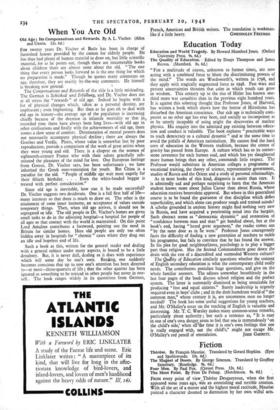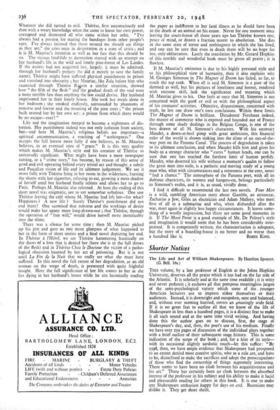Fiction
The Magnet of Doom. By George Simenon. Translated by Geoffrey Sainsbury. (Routledge. 9s. 6d.)
The Moot Point. By Peter De Polnay. (Hutchinson. 9s. 6d.) FROM every point of view Therese Desqueyroux, when she first w appeared some years ago,• was an astonishing and terrible creation. With all the art of a master and the highest moral rectitude, Mauriac painted a character doomed to damnation by her own wilful acts.
Whatever she did turned to evil. Therese, first unconsciously and then with a weary knowledge when she came to know her own power, corrupted and destroyed all who came within her orbit. " I've always had a passion for tearing the bandages from other people's eyes. I've always insisted that those around me should see things as they are," she cries once in desperation in a state of crisis ; and it is M. Mauriac's intention as well as her fate that this should be so. The vicious landslide to damnation started with an attempt on her husband's life in the wild and lonely pine-forest of Les Landes. If the assizes had not acquitted her, largely, it must be admitted, through her husband's perjury (he did it merely to save the family name), Therese might have suffered physical punishment in prison and vanished into obscurity ; but Mauriac, like Zola before him who examined through Therese Raauin a similar situation, showed how " the filth of the flesh " and thegradual death of the soul were a more terrible fate than anything the law could devise. Her husband imprisoned her in their lonely house. She took her meals alone in her bedroom ; she smoked endlessly, surrounded by phantoms of remorse and horror and the moaning of the pine trees ; " the prison built around her by her own act: a prison from which there would be no escape—ever ! "
Life and the imagination merged to become a nightmare of dis- tortion. Her punishment indeed was not only isolation from society, but—and here M. Mauriac's religious beliefs are important—a spiritual excommunication, a reaching • of " nothingness." One accepts the full horror more fully if one believes, as M. Mauriac believes, in an eventual state of " grace." It is this very quality which makes M. •Mauriac's style and his creation of Therese so universally significant. What might have been a mere newspaper cutting, or a " crime story," has become, by reason of this sense of good and evil operating behind every trivial act and thought, a subtle and Pascalian vision of life and its ultimate judgement. We see it more fully with Therese lying in her room in the wilderness, burning the sheets with her cigarettes, refusing to eat, growing a mere shadow of herself until her husband finally relents and allows her to go to Paris. Perhaps M. Mauriac also relented. At least the ending of this short novel was enigmatic, not to say somewhat nebulous. One saw Therese leaving the café where M. Mauriac had left her—for what? Happiness ? A new life ? Surely Therese's punishment did not end there! One surmised that remorse and the workings of desire would make her agony more long-drawn-out ; that Therese, through the operation of " free will," would drive herself more inextricably into the slime.
There was a silence for some time ; then M. Mauriac picked up his pen and gave us two more glimpses of what happened to her in the form of short stories and a final novel depicting her end. In Therese a l'Hotel, we see Therese hammering frantically on the doors of a love that is denied her (here she is in the full throes of the flesh) and in Therese Chez le Docteur the victim of a patho- logical obsession haunted by her act of poisoning. But it is not until La Fin de la Nuit that we really see what she must have suffered. In this novel the full extent of her degradation, as an old woman on the verge of death, is presented with quite frightful insight. Here the full significance of her life comes to her as she lies dying in her husband's house while he sits laconically reading the paper as indifferent to her fatal illness as he Would have been to the death of an animal an his estate. Never for one moment since leaving the court-house all those years ago has Therese known rest, peace of mind, or drawn a fraction nearer to absolution. She dies in the same state of terror and nothingness in which she has lived, and one can be sure that even in death there will be no hope for her, only obliteration. Lastly the translation by Mr. Gerard Hopkins of ;his terrible and wonderful book must be given all praise ; it is flawless.
If M. Mauriac's eminence is due to his highly personal style and to his philosophical view of humanity, then it also explains why M. Georges Simenon in The Magnet of Doom has failed, so far, to reach the top rank. When all is said M. Simenon is a poet of the damned as well, but his pictures of loneliness and horror, rendered with extreme skill, lack the significance and meaning which M. Mauriac gives to his. One feels at once that M. Simenon is not concerned with the good or evil or with the philosophical aspect of his creatures' activities. Objective, dispassionate concerned with truth, he lets one draw one's own conclusions. Within these limits The Magnet of Doom is brilliant. Dieudonne Ferchaux indeed, the master of commerce who is exposed and hounded out of France through some shady dealings in the Belgian Congo, is one of the best drawn of all M. Simenon's characters. With his secretary Maudet, a down-at-heel pimp with great ambitions, this financial ruler of the world is shown sinking into the slime of an out-of-the- way port on the Panama Canal. The process of degradation is taken to its ultimate conclusion, and when Maudet kills him and gives his body-..to a strange character who "cures " human heads, one can be sure that one has reached the furthest -limit of human perfidy. Maudet, who deserted his wife without a moment's qualm to follow the great man into exile, is a pathetic and moving study of a young man who, what with circumstances and a rottenness at the core, never " had a chance." The atmosphere of the Panama port, with all its dubious characters, its women and hangers-on, belongs particularly to Simenon's realm, and it is, as usual, vividly done.
I find it difficult to recommend the last two novels. Four Men is a wild, rambling American story about Gamble an aristocrat, Zacharias a Jew, Giles an electrician and Adam Mallory, who meet first of all in a submarine and who, when disbanded after the war, meet again in slightly less happy circumstances. It leaves some- thing of a woolly impression, but there are some good moments in it. If The Moot Point is a good example of Mr. De Polnay's style and imagination it would seem that he has been considerably over- praised. It is competently written, the characterisation is adequate, but the story of a boarding-house is no better and no worse than































 Previous page
Previous page